BMW X2 vs Toyota C-HR – Performance, range & efficiency compared
Costs and Efficiency:
When it comes to price and running costs, the biggest differences usually appear. This is often where you see which car fits your budget better in the long run.
Toyota C-HR has a significantly advantage in terms of price – it starts at 29100 £, while the BMW X2 costs 41200 £. That’s a price difference of around 12094 £.
Fuel consumption also shows a difference: Toyota C-HR manages with 0.80 L and is therefore significantly more efficient than the BMW X2 with 4.50 L. The difference is about 3.70 L per 100 km.
Engine and Performance:
Power, torque and acceleration are the classic benchmarks for car enthusiasts – and here, some clear differences start to show.
When it comes to engine power, the BMW X2 has a evident edge – offering 300 HP compared to 223 HP. That’s roughly 77 HP more horsepower.
In acceleration from 0 to 100 km/h, the BMW X2 is distinct quicker – completing the sprint in 5.40 s, while the Toyota C-HR takes 7.40 s. That’s about 2 s faster.
In terms of top speed, the BMW X2 performs noticeable better – reaching 250 km/h, while the Toyota C-HR tops out at 180 km/h. The difference is around 70 km/h.
Space and Everyday Use:
Cabin size, boot volume and payload all play a role in everyday practicality. Here, comfort and flexibility make the difference.
Both vehicles offer seating for 5 people.
In curb weight, Toyota C-HR is minimal lighter – 1505 kg compared to 1645 kg. The difference is around 140 kg.
In terms of boot space, the BMW X2 offers noticeable more room – 560 L compared to 447 L. That’s a difference of about 113 L.
In maximum load capacity, the BMW X2 performs distinct better – up to 1470 L, which is about 315 L more than the Toyota C-HR.
When it comes to payload, BMW X2 somewhat takes the win – 510 kg compared to 425 kg. That’s a difference of about 85 kg.
Who wins the race?
The Toyota C-HR proves to be is largely superior and therefore becomes our DriveDuel Champion!
Toyota C-HR is the better all-rounder in this comparison.
Costs and Consumption
View detailed analysis
Engine and Performance
View detailed analysis
Dimensions and Body
View detailed analysis
 @ Toyota Motor Corporation
@ Toyota Motor Corporation
Toyota C-HR
BMW X2
The BMW X2 feels like a sporty coupe dressed as an SUV, with sharp styling and a cheeky, youthful attitude that stands out in traffic. Inside it's driver-focused and compact but smartly packaged, perfect for city life and buyers who want BMW flair without the usual SUV bulk.
details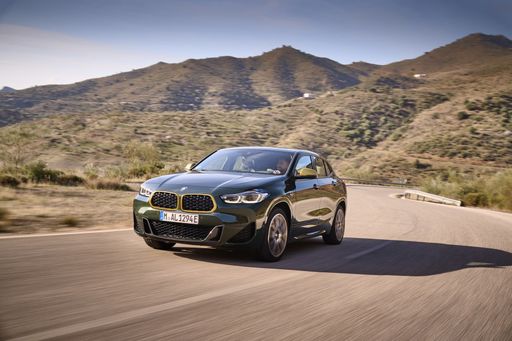 @ BMW Group Press
@ BMW Group Press
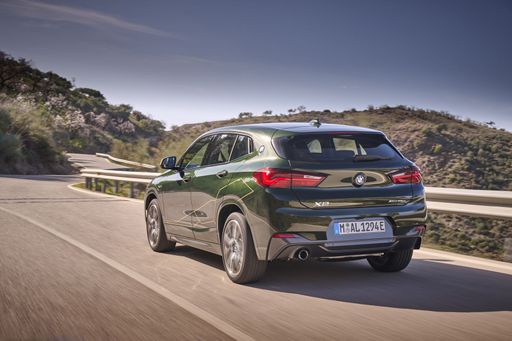 @ BMW Group Press
@ BMW Group Press
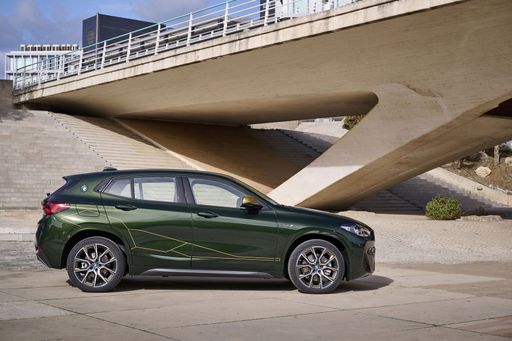 @ BMW Group Press
@ BMW Group Press
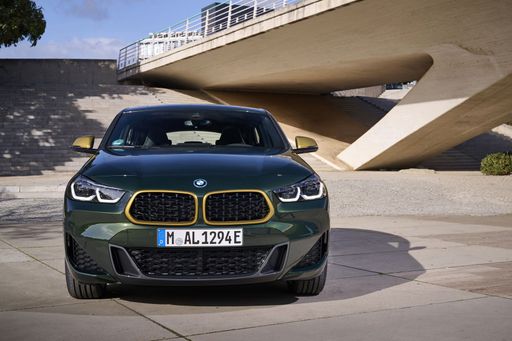 @ BMW Group Press
@ BMW Group Press
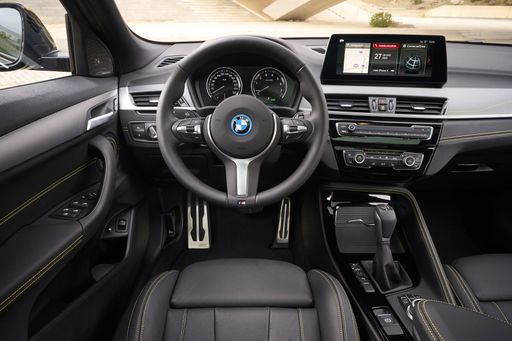 @ BMW Group Press
@ BMW Group Press
Toyota C-HR
The Toyota C-HR cuts a striking figure with its angular styling and coupe-like profile, so you’ll never go unnoticed in the supermarket car park. It balances everyday practicality with a nimble, city-friendly personality, making routine commutes feel a touch more fun without asking for forgiveness.
details @ Toyota Motor Corporation
@ Toyota Motor Corporation
 @ Toyota Motor Corporation
@ Toyota Motor Corporation
 @ Toyota Motor Corporation
@ Toyota Motor Corporation
 @ Toyota Motor Corporation
@ Toyota Motor Corporation
 @ Toyota Motor Corporation
@ Toyota Motor Corporation
 @ BMW Group Press
@ BMW Group Press
|
 @ Toyota Motor Corporation
@ Toyota Motor Corporation
|
|
|
|
Costs and Consumption |
|
|---|---|
|
Price
41200 - 58900 £
|
Price
29100 - 42800 £
|
|
Consumption L/100km
4.5 - 7.7 L
|
Consumption L/100km
0.8 - 5.1 L
|
|
Consumption kWh/100km
-
|
Consumption kWh/100km
-
|
|
Electric Range
-
|
Electric Range
68 km
|
|
Battery Capacity
-
|
Battery Capacity
-
|
|
co2
118 - 174 g/km
|
co2
17 - 115 g/km
|
|
Fuel tank capacity
45 - 54 L
|
Fuel tank capacity
43 L
|
Dimensions and Body |
|
|---|---|
|
Body Type
SUV
|
Body Type
SUV
|
|
Seats
5
|
Seats
5
|
|
Doors
5
|
Doors
5
|
|
Curb weight
1645 - 1780 kg
|
Curb weight
1505 - 1755 kg
|
|
Trunk capacity
515 - 560 L
|
Trunk capacity
350 - 447 L
|
|
Length
4554 - 4567 mm
|
Length
4362 mm
|
|
Width
1845 mm
|
Width
1832 mm
|
|
Height
1575 - 1590 mm
|
Height
1558 - 1564 mm
|
|
Max trunk capacity
1400 - 1470 L
|
Max trunk capacity
1076 - 1155 L
|
|
Payload
495 - 510 kg
|
Payload
375 - 425 kg
|
Engine and Performance |
|
|---|---|
|
Engine Type
Diesel MHEV, Petrol MHEV, Diesel, Petrol
|
Engine Type
Full Hybrid, Plugin Hybrid
|
|
Transmission
Automatic
|
Transmission
Automatic
|
|
Transmission Detail
Dual-Clutch Automatic
|
Transmission Detail
CVT
|
|
Drive Type
Front-Wheel Drive, All-Wheel Drive
|
Drive Type
Front-Wheel Drive, All-Wheel Drive
|
|
Power HP
150 - 300 HP
|
Power HP
140 - 223 HP
|
|
Acceleration 0-100km/h
5.4 - 8.9 s
|
Acceleration 0-100km/h
7.4 - 9.9 s
|
|
Max Speed
207 - 250 km/h
|
Max Speed
175 - 180 km/h
|
|
Torque
280 - 400 Nm
|
Torque
-
|
|
Number of Cylinders
3 - 4
|
Number of Cylinders
4
|
|
Power kW
110 - 221 kW
|
Power kW
103 - 164 kW
|
|
Engine capacity
1499 - 1998 cm3
|
Engine capacity
1798 - 1987 cm3
|
General |
|
|---|---|
|
Model Year
2024
|
Model Year
2024 - 2025
|
|
CO2 Efficiency Class
D, F
|
CO2 Efficiency Class
C, B
|
|
Brand
BMW
|
Brand
Toyota
|
What drive types are available for the BMW X2?
The BMW X2 is offered with Front-Wheel Drive or All-Wheel Drive.
The prices and data displayed are estimates based on German list prices and may vary by country. This information is not legally binding.
